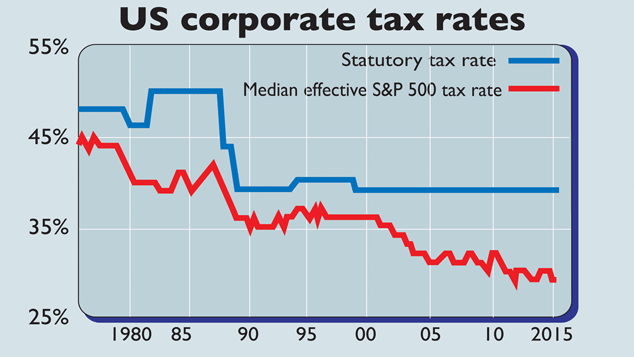The end of corporate tax havens?
Corporate tax havens are slowly heading for extinction after the EU officials ruled them unfair.
Get the latest financial news, insights and expert analysis from our award-winning MoneyWeek team, to help you understand what really matters when it comes to your finances.
You are now subscribed
Your newsletter sign-up was successful
Want to add more newsletters?

Twice daily
MoneyWeek
Get the latest financial news, insights and expert analysis from our award-winning MoneyWeek team, to help you understand what really matters when it comes to your finances.

Four times a week
Look After My Bills
Sign up to our free money-saving newsletter, filled with the latest news and expert advice to help you find the best tips and deals for managing your bills. Start saving today!

American companies "are more profitable than ever", says Ben Levisohn atBarron's partly due to how little tax they are paying. The corporate tax rate in America is among the highest in the world, at 39%. But the actual rate paid by companies has fallen to 29%, from 35% in 1990. And some pay far less: cruise-ship operator Carnival has paid an average of just 1% of income in taxes in the past ten years.
Why the disparity? America only taxes companies on their domestic earnings, so a firm's tax bill can legitimately be lowered by shifting profits overseas,where tax rates are lower. "Hence the relentless rise of tax planning as a core part of multinationals' business plans," says The Economist.
The OECD think tank estimates that this may be costing national exchequers "as much as $240bn a year, or 10% of global corporate income-tax receipts". But now, a backlash may be imminent. "Every government is looking for revenue," David Kostin of Goldman Sachs tells Barron's. That poses "a risk to companies that have been paying low taxes".
MoneyWeek
Subscribe to MoneyWeek today and get your first six magazine issues absolutely FREE

Sign up to Money Morning
Don't miss the latest investment and personal finances news, market analysis, plus money-saving tips with our free twice-daily newsletter
Don't miss the latest investment and personal finances news, market analysis, plus money-saving tips with our free twice-daily newsletter
In particular, many firms have become experts at arbitraging the European Union's tangle of different national tax regimes. But last week, the EU's antitrust officials ruled that tax breaks that some EU members had granted to Fiat Chrysler, Starbucks and other multinationals constituted unfair state aid. These arrangements "shifted profits from one company to another in the same group, with no valid economic justification", EU antitrust chief Margrethe Vestager told The Wall Street Journal.
The rulings showed that "artificial and complex methods endorsed by tax rulings cannot mask the actual profits of a company, which must be properly and fully taxed". Now regulators are looking into hundreds of tax agreements across the EU, including investigations involving Apple in Ireland and Amazon in Luxembourg.
Although the firms involved say they have done nothing wrong, it's clear that corporate tax havens "are gradually... heading for extinction", says Edward Hadas on BreakingViews.com. Some firms are already changing their practices. Higher taxes will put margins under pressure and opportunities to cut costs are limited. Hence future earnings growth may be weaker than expected which is likely to be bad news for the historically expensive US market.
Get the latest financial news, insights and expert analysis from our award-winning MoneyWeek team, to help you understand what really matters when it comes to your finances.
Marina Gerner is an award-winning journalist and columnist who has written for the Financial Times, the Times Literary Supplement, the Economist, The Guardian and Standpoint magazine in the UK; the New York Observer in the US; and die Bild and Frankfurter Rundschau in Germany.
Marina is also an adjunct professor at the NYU Stern School of Business at their London campus, and has a PhD from the London School of Economics.
Her first book, The Vagina Business, deals with the potential of “femtech” to transform women’s lives, and will be published by Icon Books in September 2024.
Marina is trilingual and lives in London.
-
 Should you buy an active ETF?
Should you buy an active ETF?ETFs are often mischaracterised as passive products, but they can be a convenient way to add active management to your portfolio
-
 Power up your pension before 5 April – easy ways to save before the tax year end
Power up your pension before 5 April – easy ways to save before the tax year endWith the end of the tax year looming, pension savers currently have a window to review and maximise what’s going into their retirement funds – we look at how